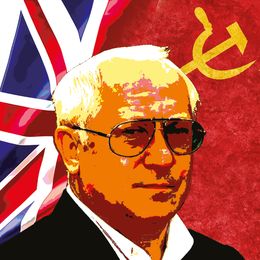When posted to Moscow as young diplomats in the early 1980s, we were warned, by gruff men in dark glasses, against the famed KGB honeytrap: we waited in vain for the femme fatale to appear. Meanwhile we shivered in sub-zero temperatures and foraged for the next meal in a market plagued by shortages. One of my lifelines was a bread shop across the sweeping Kutuzovsky Prospekt; it was a place of great whimsy: often, its bare shelves stared back stonily but, on some days, a fresh loaf of black rye would make the revolution seem worth it.
Four decades later, the same bread shop—and not some long-legged ballerina—is my improbable, tenuous link to the murky world of Cold War espionage. It was there, in July 1985, that the KGB’s Oleg Gordievsky, arguably the most significant double agent of the Cold War, flew the signal to his MI6 handlers that he needed to be rescued from the Soviet Union. As previously agreed, he held in his hand a Safeway bag, with its distinctive red logo; in acknowledgement, a British intelligence officer walked past him holding a green Harrod’s bag and eating a Mars bar, thereby activating Operation Pimlico, one of the most daring escapes engineered during the Cold War.
Gordievsky’s alternative to a chancy escape was certain execution. Once a KGB rising star, he had lost faith in the Soviet system, disillusioned by the building of the Berlin Wall and the crushing of the 1968 Prague Spring. An admirer of western democracy and freedom, he was a ready recruit for MI6, an ideological convert not unlike Kim Philby, only in the opposite direction. For 13 years, he lived dangerously as a double agent in an operational landscape of handlers, safe houses, dead drops and brush contacts. And even as he supplied MI6 with invaluable intelligence, he rose to become the KGB’s top man in the UK.
But in 1985, a KGB mole in the CIA brought Gordievsky under suspicion. He was recalled to Moscow, drugged and interrogated. But he refused to confess. Instead, standing outside that bread shop, he activated the escape plan and was miraculously smuggled into Finland in the boot of a British intelligence officer’s car, leaving behind his wife and two daughters.
Gordievsky impacted the Cold War at a crucial time when Reaganite rhetoric, Soviet paranoia and the downing of a Korean airliner in September 1983 had ratcheted tensions to a dangerous high. NATO’s war game Able Archer set off alarm bells in Moscow as a possible prelude to a nuclear strike. Gordievsky’s reports, conveyed to Thatcher and Reagan, provided new insights into Kremlin’s fears and sobered up western rhetoric, avoiding a possible nuclear confrontation. When Gorbachev, still a rising star, visited London in 1984, Gordievsky provided critical inputs for his meeting with Thatcher, and did the same for Thatcher through MI6. Not surprisingly, the meeting was a success and Thatcher famously concluded that Gorbachev was a man “one could do business with”.
Oleg Gordievsky died last month, having lived for 40 years under a false name in a safe house in suburban England. An intelligence celebrity, he gave interviews, wrote books, was received by Thatcher and Reagan and honoured by the Queen. But it must have been lonely: though reunited with his family, his marriage did not survive the stress it underwent and he never saw his mother or sister again. Ben Macintyre, the author of the marvellous The Spy and the Traitor, best sums it up: “The pantheon of world-changing spies is tiny but Gordievsky is in it, somewhere near the top: the most solitary man I have ever met, and the bravest.”
The writer is former ambassador to the US.


